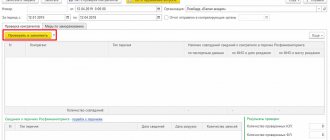Attention!
the DISCLAIMERS as you read the information below .
The article is intended for non-profit organizations , since it analyzes the regulations of the Bank of Russia and the corresponding reporting forms.
The article was updated on March 28, 2019 . You can clarify the relevance of the information by contacting us.
One of the main responsibilities of NFOs in the field of AML/CFT is the submission of information to Rosfinmonitoring.
Important
Reporting in the form of formalized electronic messages (FES) must be submitted from May 30, 2015 - the date of entry into force of the Bank of Russia Directive No. 3484-U dated December 15, 2014 “On the procedure for submitting by non-credit financial institutions to the authorized body the information provided for by the Federal Law “On Counteracting legalization (laundering) of proceeds from crime and financing of terrorism.”
Updated
From March 23, 2022, Bank of Russia Directive No. 4937-U dated October 17, 2018 “On the procedure for submitting information and information by non-credit financial institutions to the authorized body in accordance with Articles 7, 7.5 of the Federal Law “On Combating Legalization (Laundering) of Income Received criminally and the financing of terrorism."
Directive N 3484-U has lost force.
The presence of a format-logical control (FLC) system in your personal account on the Rosfinmonitoring website will not allow you to send a FES containing obvious errors. However, not all defects are identified through FLC.
Most often, errors are made in reports on the results of checking the presence among their clients of organizations and individuals in respect of whom measures to freeze (block) funds or other property have been applied or should be applied (FES form 04).
Indicators of the “Address” data type are filled in incorrectly.
Obvious errors in filling out indicators of the “Address” data type are identified at the stage of checking the correctness of the FES design:
- the sequence of indicating the semantic part and the abbreviated name of the type of indicator is broken (for example, “St. Petersburg” is indicated instead of the correct “St. Petersburg”);
- absence of an abbreviated name for the type of indicator (for example, “Moscow” is indicated instead of the correct “Moscow g”).
Important
In some cases, when checking the FLC, an error will be detected: “The locality is not specified or incorrectly specified in the address of the place of registration/residence of the legal entity, individual entrepreneur of the resident presenting the information.”
Attention!
Be careful! Even in the instructions for sending reports posted in your personal account on the Rosfinmonitoring website, the rules for filling out indicators of the “Address” data type in the FES are not followed.
Unfortunately, checking the FLC does not reveal such an error in filling out the indicator as putting a dot after the abbreviated name of the indicator type (for example, “Penza city” instead of the correct “Penza city”).
Read more…
We recommend that you familiarize yourself with the rules for shortening addresses in the FES .
Innovations from Rosfinmonitoring Letter No. 63
In September 2022, Rosfinmonitoring Letter No. 63 dated September 20, 2021 came into force. This is not a fundamentally new document, but an updated letter No. 50 dated February 10, 2016 for jewelry industry specialists. The regulator supplemented it with answers to questions about legal requirements and removed some of the responsibilities of the jewelry sector. Let's look at them point by point.
It is now possible to send FES only in cash
The jewelry sector now has the right not to submit FES information about property transactions to Rosfinmonitoring. To do this, organizations need to fulfill two conditions:
- register in GIIS DMDK;
- timely enter information into the system about the sale and receipt of precious metals.
This is stated in paragraph 5 of the letter. That is, the regulator has almost halved the burden on jewelers. However, we do not recommend immediately refusing to send FES for property transactions. GIIS is a fairly new system, which may cause problems when working with it. And if you make a mistake in the GIIS, the regulator will record two violations at once: both in the accounting of precious metals and in sending information to Rosfinmonitoring.
Reinforced existing concepts and explained new ones
Rosfinmonitoring has fixed the concepts of “client”, “service”, “buyer” and “deliverer”.
Buyer is an organization (IP) that purchases precious metals and precious stones, jewelry made from them and scrap of such products. The deliverer is the buyer's client.
Information on mandatory control is sent by the person providing the service to the client. This means that the FES is sent by the buyer. In the letter, the regulator prescribed how to correctly indicate roles in a message (clause 12 of the letter).
| Operation (transaction) participant role code | 99-other |
| Text field | Buyer/Deliverer |
Sending FES for transactions that are subject to mandatory control and are classified as suspicious
Let’s say a client, an individual, comes to your jewelry store for three days in a row and buys the same type of earrings for 800,000 rubles. You have already identified this person, analyzed the transactions, and realized that they are suspicious. A situation arises that the last transaction of 800,000 is both subject to mandatory control and suspicious. In this case, Rosfinmonitoring proposes to create a FES for a suspicious transaction, and indicate the mandatory control code in the field “Additional code for the type of operation of this message” (clause 13 of the letter).
What information about beneficiaries must be provided?
Many beneficiaries want to remain “incognito”. But starting from 2022, the requirements for beneficiaries have been tightened and the following are now required:
- grounds for recognizing an individual as a beneficial owner;
- a list of measures (procedures) aimed at identifying and identifying the beneficial owners of clients by the organization, including a list of documents and other information requested from clients;
- grounds for recognizing the sole executive body of a client legal entity as the beneficial owner if it is impossible to identify the beneficial owner;
- the procedure for an organization to make a decision to recognize an individual as a beneficial owner;
- the procedure for recording information obtained as a result of identifying the beneficial owner.
How specifically do banks establish information about beneficiaries? Everything is simple here, banks use well-functioning mechanisms:
- inclusion in the contract with clients of the obligation of the latter to provide information about beneficial owners;
- customer surveys to identify beneficial owners;
- study of constituent documents of clients-legal entities;
- oral survey of clients with information entered into their questionnaire.
But if the client does not provide information about the beneficiary, the bank may either not allow the transaction to proceed, or may suspend account transactions.
About appealing the decision
The client was denied service, citing the provisions of Law 115-FZ. How can he appeal this decision?
A client who has been refused service may submit documents or information to the bank confirming that there are no grounds for refusal. The bank must review these documents within 10 working days. As a result, the client will be told:
- that the basis for denial of service has been eliminated;
- that it cannot be eliminated based on the documents and data provided.
If the above step does not help, the client has the right to contact the interdepartmental commission at the Bank of Russia . At the same time, he must submit documents in accordance with the Directive of the Central Bank dated March 30, 2018 No. 4760-U. The commission will consider these documents, as well as the bank’s reasoned justification for refusing service. As a result, a decision will be made:
- about the absence of grounds according to which the bank decided to refuse service (decision in favor of the client);
- about the absence of grounds for revising the decision made by the bank (decision in favor of the bank).
The rendered decision is communicated to the parties within 3 working days from the date of adoption. It is binding on the bank.
If the interdepartmental commission made a decision in favor of the client, then upon his subsequent application the bank will not be able to refuse to open an account or conduct a transaction.
In addition, the client always has the right to go to court.
On information interaction between banks
The client was rejected by one bank and turned to another. How does this credit institution find out that the first bank previously refused to service the client?
The scheme for transmitting such information is as follows:
- banks report “refused” clients to Rosfinmonitoring;
- RFA transmits information to the Central Bank (clause 13.2. Article 7 of Law No. 115-FZ);
- The Central Bank of the Russian Federation communicates the received information to all credit and non-credit financial institutions in the manner approved by its regulation No. 639-P on March 30, 2018 (clause 13.3. Article 7 of Law No. 115-FZ).
About the suspension of transactions
Can Rosfinmonitoring suspend the operation?
Yes maybe. The service is authorized to do this by Article 8 of Law 115-FZ. The order is:
- The bank blocks the transaction for the above reasons for 5 days and transfers the information to the RFM.
- The service conducts a preliminary inspection, and if the grounds for blocking are confirmed, it decides to suspend operations for up to 30 days.
- If the period for which the bank blocked the operation comes to an end, and there is no decision of the RFA on suspension, then the operation is carried out.
Reporting to Rosfinmonitoring
In accordance with Article 7, paragraph 1, paragraph 7 of the Law “On Combating the Legalization (Laundering) of Proceeds from Crime and the Financing of Terrorism,” a pawnshop is obliged at least once every 3 months to check the presence of organizations and individuals among its clients, in in relation to which measures to freeze (block) funds or other property have been applied or should be applied. The Accounting Department of a Jewelry Pawnshop provides checks according to the following lists:
- terrorists
- persons with frozen assets
- persons involved in FROM
- “refuseniks”
About the grounds for refusal of service
What are the grounds for terminating a bank account agreement or refusing to carry out a transaction?
The right of credit institutions to refuse services to clients is enshrined in paragraph 5.2 of Article 7 of Law 115-FZ. In particular, banks have the right :
- Refuse to enter into an agreement if there are suspicions that the purpose of the operation is the laundering of criminal proceeds or the financing of terrorism.
- Terminate the contract if during the calendar year 2 or more times a decision was made to refuse to execute the client’s order on the basis of paragraph 11 of Article 7 of Federal Law No. 115-FZ.
As for the last point, banks have the right to refuse a client to execute his order if the documents required for internal control are not submitted . And also if a bank employee has suspicions that the operation may be related to extremism or terrorism.
The procedure for refusing clients to carry out a transaction or making a decision to terminate an account is fixed in the internal documents of the bank. The bank is obliged to report all such cases to Rosfinmonitoring.
How does the know your customer principle work?
Coming to the bank, the client is faced with the fact that the bank requests a lot of additional information.
You need to provide documents, fill out a form, etc. KYC or Know Your Customer is translated from English as “Know your customer.” Behind this are the rules and procedures for identifying and verifying (checking) clients in banking to assess the risks associated with them. Their goal is to prevent money laundering and other illegal activities. The bottom line is that banks must understand their client’s business as best as possible: what it does, what markets it operates in, what categories of clients and suppliers it interacts with, what turnover it has, etc. Mandatory identification procedures include:
- for individuals - citizens of the Russian Federation - their full name, citizenship, date of birth, and details of an identity document are specified;
- Foreign individuals are additionally asked for migration card details and confirmation of legal stay in the Russian Federation;
- Russian legal entities are required to provide the name, legal form, TIN, OGRN, legal address;
- Foreign legal entities will additionally be asked for information about registration in the Russian Federation (code and address), place and address of registration in the foreign state to which the legal entity belongs;
- a foreign structure without the formation of a legal entity (for example, a trust) will be required to indicate the name, information about the country of incorporation, registration codes as a taxpayer, information about the location of the main activity, as well as about the property under management and about the founders and managers (full name and permanent address) .
There is also a simplified identification in the following cases:
- the transaction performed by the client is not subject to special control (according to the criteria established by Law No. 115-FZ);
- the client does not arouse suspicion among bank employees;
- the transaction is not unusual, has questionable economic meaning, and does not suggest that its purpose is to avoid the client from full due diligence procedures.
There are also operations that cannot be identified at all:
- money transfers without opening an account for amounts up to RUB 15,000. The list of exceptions - goods and services, transactions with which are not subject to exemption from identification, is established by the Government of the Russian Federation;
- purchase by an individual of currency in the amount (equivalent) of no more than 40,000 rubles;
- purchase by an individual of products made of precious metals and precious stones at retail for an amount (equivalent) of no more than 40,000 rubles. The same thing, but with the use by an individual of electronic means of payment for an amount (equivalent) of up to 100,000 rubles.
Group printing of questionnaires
At the request of the Central Bank, the pawnshop must provide customer profiles. The composition of the information provided by the organization is determined by the Regulation of the Bank of Russia dated December 12, 2014 N 444-P.
The selection of questionnaires can be limited to the branch
(the value is set in the Branch field), specific
pledgors
(pledgors added to the tabular part through
the Pledgor Search Parameters
).
About maintaining blacklists
There is information in the business environment about the existence of blacklists of persons who are involved in dubious transactions. Does Rosfinmonitoring maintain such lists?
The RFA answered this question as follows: it only maintains a list of persons who are involved in terrorism and extremist activities. Persons are included in this list on the basis of paragraphs 2.1 and 2.2 of Article 6 of Law 115-FZ of 08/07/2001. Rosfinmonitoring does not maintain any other lists, including those of persons involved in questionable transactions.



